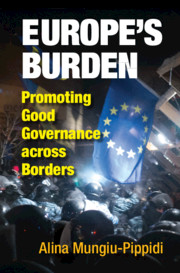Lebanon’s protesters want ethical universalism, even if the phrase doesn’t appear on any banners or placards.
Freedom is no longer enough. They are demanding a government that represents and services citizens individuals, irrespective of personal attributes, such as sectarian identity, said Prof. Alina Mungiu-Pippidi of Berlin’s Herthie School of Governance, delivering the Sixteenth Annual Seymour Martin Lipset Lecture on Democracy in the World (above).
Such demands are rooted in a tradition stretching back to Cicero in ancient Rome – who led the first naming and shaming campaign – through Catholic theologians like Aquinas and Marsilio of Padua to Montesquieu and the Federalists’ insistence on separation of powers, and the French Revolution’s export of constitutionalism and Napoleonic legal codes, she added, speaking at the Canadian Embassy in Washington, D.C.
 The adoption of the United Nations Convention against Corruption, the world’s only legally binding universal anti-corruption instrument, without opposition from any member states signaled the end of moral relativism in governance – in theory, said Mungiu-Pippidi, author of “Controlling Corruption through Collective Action,” Journal of Democracy (Jan. 2013).
The adoption of the United Nations Convention against Corruption, the world’s only legally binding universal anti-corruption instrument, without opposition from any member states signaled the end of moral relativism in governance – in theory, said Mungiu-Pippidi, author of “Controlling Corruption through Collective Action,” Journal of Democracy (Jan. 2013).
But the transition from norm to practice has been rare and most of world remains particularistic, with governance marred by corruption, favoritism and nepotism, despite the billions spent on good governance by the US and the European Union (the EU invested one billion Euros on rule of law in Turkey alone). Perversely, she added, the greatest disasters occurred in states where the West had most leverage, including Kosovo, Bosnia, Moldova and Turkey.
Given this track record, the key question remains: Do we try to put the dragon back in the egg or do we need to learn to ride it? said Mungiu-Pippidi, chair of ERCAS – the European Research Centre for Anticorruption and Statebuilding.
 In her new book, Europe’s Burden. Promoting Good Governance across Borders, Mungiu-Pippidi questions the efficacy of the EU’s promotion of good governance through its funding and conditionalities both within the EU proper and externally. The idea of European power transforming the quality of governance is largely a myth, she contends. From Greece to Egypt and from Kosovo to Turkey, EU interventions in support of good governance and anti-corruption failed to trigger the domestic dynamics needed for sustainable change.
In her new book, Europe’s Burden. Promoting Good Governance across Borders, Mungiu-Pippidi questions the efficacy of the EU’s promotion of good governance through its funding and conditionalities both within the EU proper and externally. The idea of European power transforming the quality of governance is largely a myth, she contends. From Greece to Egypt and from Kosovo to Turkey, EU interventions in support of good governance and anti-corruption failed to trigger the domestic dynamics needed for sustainable change.
Till Hartmann and Mungiu-Pippidi’s Corruption and Development: a Reappraisal in Oxford Research Encyclopaedia is available here (HT: ERCAS).







